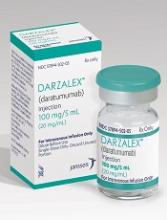The European Commission (EC) has expanded the approved use of the anti-CD38 antibody daratumumab (Darzalex®).
Daratumumab is now approved for use in combination with lenalidomide and dexamethasone or bortezomib and dexamethasone for the treatment of adults with multiple myeloma (MM) who have received at least 1 prior therapy.
The EC previously granted conditional approval for daratumumab as monotherapy for the treatment of adults with relapsed or refractory MM whose prior treatment included a proteasome inhibitor and an immunomodulatory agent and who demonstrated disease progression on their last therapy.
Now, the EC has granted daratumumab full approval for this indication. The conditional approval was contingent upon Janssen, the company developing daratumumab, providing additional data from the phase 3 POLLUX and CASTOR trials.
As these data have been provided, the EC said the specific obligations associated with the conditional approval have been fulfilled, allowing the switch from conditional to full approval.
The EC’s decision to grant daratumumab approval in combination with lenalidomide and dexamethasone or bortezomib and dexamethasone was also based on data from the POLLUX and CASTOR trials.
In the POLLUX trial, researchers compared treatment with lenalidomide and dexamethasone to treatment with daratumumab, lenalidomide, and dexamethasone in patients with relapsed or refractory MM.
Patients who received daratumumab in combination had a significantly higher response rate and longer progression-free survival than patients who received the 2-drug combination.
However, treatment with daratumumab was associated with infusion-related reactions and a higher incidence of neutropenia.
Results from this trial were published in NEJM in October 2016.
In the CASTOR trial, researchers compared treatment with bortezomib and dexamethasone to treatment with daratumumab, bortezomib, and dexamethasone in patients with previously treated MM.
Patients who received the 3-drug combination had a higher response rate, longer progression-free survival, and a higher incidence of grade 3/4 adverse events than those who received the 2-drug combination.
Results from this trial were published in NEJM in August 2016.


